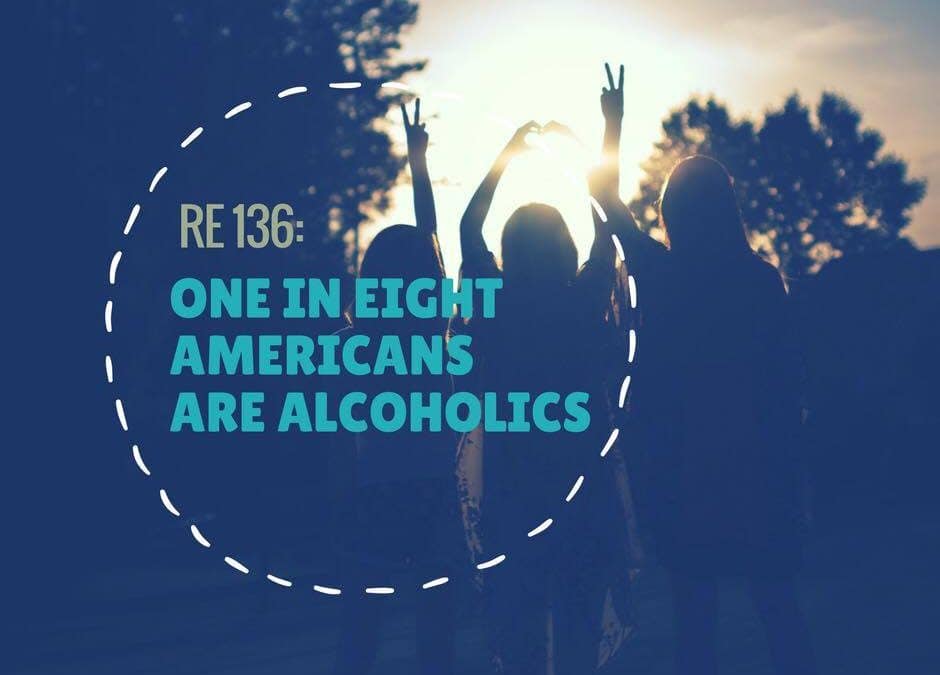
by Paul Churchill | Sep 25, 2017 | Podcast
Podcast: Play in new window | Download
Subscribe to the Recovery Elevator Podcast Apple Podcasts | | More
New data has revealed that one in eight Americans are now alcoholics due to an alarming rise in alcohol consumption in women, elderly people and ethnic minorities.
Experts at the National Institute on Alcohol Abuse and Alcoholism say that the rise could constitute a public health crisis that is being overshadowed by the opioid epidemic and marijuana legalization.
During an 11 year gap, the number of people who received a diagnosis of alcoholism shot up by 49 percent, meaning 12.7 percent of the population – or roughly one in eight Americans – are alcoholics.
Megan, with 11 hours since her last drink, shares her story
SHOW NOTES
[5:15] Paul Introduces Megan. I’m from Baltimore, Maryland. I am 38, single, with a live-in boyfriend.
[7:19] Paul- What forced you to reach out to me again, and give us a little background.
Megan- The whole point of what you are doing is when you can relate to other people. I love that you are an advocate for the acceptance part of it. People are ashamed to come out so to speak. I didn’t start drinking until late in college. I liked the way it made me feel. I wasn’t self-conscience. It was never really a problem. One day in my late twenties I realized I was drinking everyday.
[23:49] Paul- Talk to me about your withdrawal symptoms.
Megan- It’s usually worst the second and third day. The shaking and the anxiety is the worse. I can’t shut my brain off.
[26:36] Paul- What’s your plan? How are we going to do this?
Megan- I am going to get through today. One day at a time. Right now it is just getting through today. I know that I want to get sober and stay sober. Am I done yet? I’m not entirely sure. I want to be there, but I don’t know if I am.
[32:36] Rapid Fire Round
- What was your worst memory from drinking? Blacking out. I started drinking after a run; I woke up the next day and had no memory of how I got home.
- Did you ever have an “oh-shit” moment? About a month ago, I got up in the morning and was walking to the grocery store and I couldn’t walk. I inched across the street and went back home.
- What’s your plan moving forward?
- What’s your favorite resource in recovery? I love podcasts. The HOME Podcast, the Shair Podcast, Recovery 101.
- What’s the best advice you’ve ever received (on sobriety)? Don’t beat yourself up.
- What parting piece of guidance can you give listeners who are in recovery or thinking about quitting drinking? You are going to feel crappy. Don’t make it worse on yourself by pouring poison into yourself. It’s going to get a little bit better everyday.
- You might be an alcoholic if the liquor store on the corner knows exactly who you are, and lines up 4 mini bottles of Fireball everyday at 9:00 in the morning.
Resources mentioned in this episode:
It’s a public health crisis: 1 in 8 Americans are now alcoholics By Abigail Miller for Dailymail.com
Connect with Cafe RE– Use the promo code Elevator for your first month free
Sobriety Tracker iTunes
Sobriety Tracker Android
Sober Selfies! – Send your Sober Selfie and your Success Story to info@recoveryelevator.com
“We took the elevator down, we gotta take the stairs back up, we can do this!”
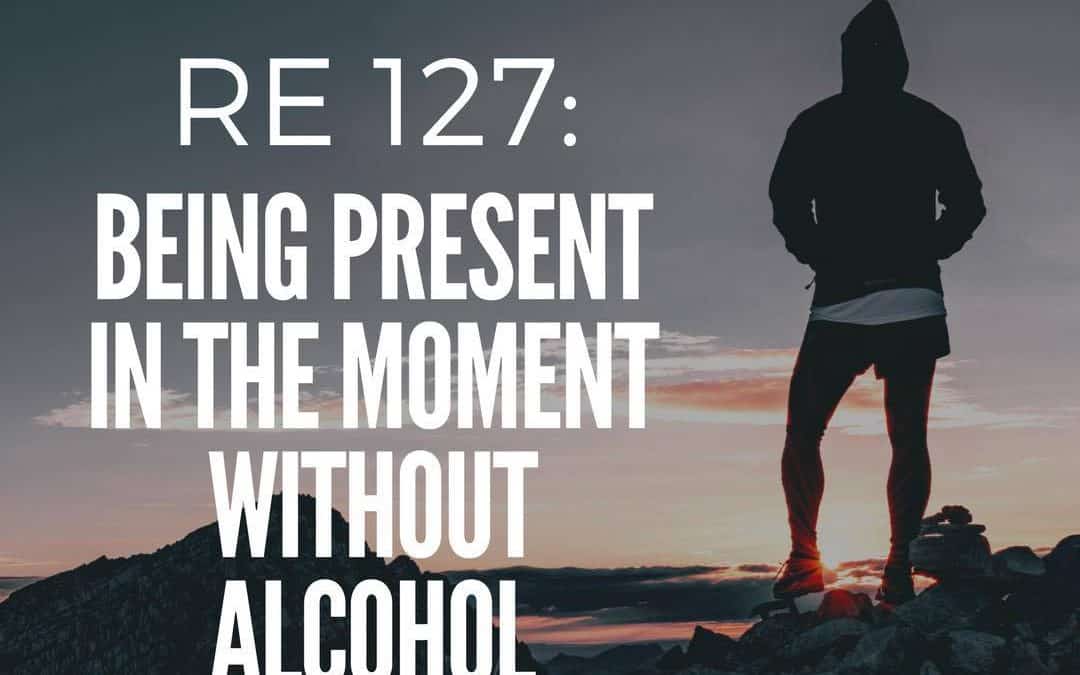
by Paul Churchill | Jul 24, 2017 | Podcast
Podcast: Play in new window | Download
Subscribe to the Recovery Elevator Podcast Apple Podcasts | | More
Rule Number One of podcasting is plug in the microphone.
Pete, with 488 days of sobriety shares his story.
SHOW NOTES
[2:19] Paul Introduces Pete. I am 38 years old, and golfing is my favorite leisure activity. I have an 8-year-old daughter and a 2-year-old son. I am in construction sales, mostly traveling around Ohio and surrounding states.
[6:07] Paul- When did you realize you had a problem with alcohol Pete?
Pete- I’ve always known, or at least had the fear of having a problem. I could drink a case of beer by myself in High school.
[12:23] Paul- Was this a bottom you experienced, or where you done?
Pete- I hit a spiritual bottom. Things that were important, no longer seemed important. My wife, great job, and truck were all things that weren’t making me happy. I realized that doing these things that I was taught would make me happy weren’t. I was bankrupt spiritually and emotionally. My wife opened the work bench, and the drawer was full of empty and full booze bottles. They were devastated. I realized that suicide wasn’t’ an option. That was the moment that made me change everything.
[17:25] Paul- What was the outpatient therapy like? Walk us through that.
Pete- I went to a state certified program. I attended with several other professionals who learned a great deal about addiction and recovery.
[24:44] Paul- What have you learned most about yourself these past 488 days?
Pete- I have learned that I like peace, calm, and serenity. I accepted chaos because that is what I knew. My life is really good, but I made it really bad by a lot of choices that I made.
[28:18] Paul- Have you had cravings, and how do you overcome cravings them?
Pete- My cravings as of today are more “I would like a drink” but more thoughts than cravings. In the beginning I had physical cravings. I don’t have the impulse to drink now. Alcohol was the medicine that fixed everything for me.
[30:25] Rapid Fire Round
- What was your worst memory from drinking? The experience with my wife and daughter not being able to ride bikes because of my booze hidden in the drawer.
- Did you ever have an “oh-shit” moment? For me it was when my mother in law died from alcoholism, in the nursing home my biggest thought was how do I get out of here and have a drink without anyone noticing.
- What’s your plan moving forward? Continue to present in the moment, and doing, not thinking about things I don’t do, and then regretting them. I just need to do the best I can.
- What’s your favorite resource in recovery? Meditation and Prayer. I’ve used the Headspace app, there is a meditation guru that lives in our village.
- What’s the best advice you’ve ever received (on sobriety)? Follow direction. Putting faith in a blind process.
- What parting piece of guidance can you give listeners who are in recovery or thinking about quitting drinking? You are feeling the way you are supposed to be feeling at that time. Talk to other people. My feelings are normal; it’s okay to relearn.
- You might be an alcoholic if when you walk out of your recovery center, and you see one of your friends that you’ve been partying with forever and he says “Hey Pete, I was surprised to see you here.” Then I thought about it, and It’s really not much of a surprise to see you here.
Resources mentioned in this episode:
Recovery Elevator Retreat
Connect with Cafe RE– Use the promo code Elevator for your first month free
Sobriety Tracker iTunes
Sobriety Tracker Android
Sober Selfies! – Send your Sober Selfie and your Success Story to info@recoveryelevator.com
“We took the elevator down, we gotta take the stairs back up, we can do this!”
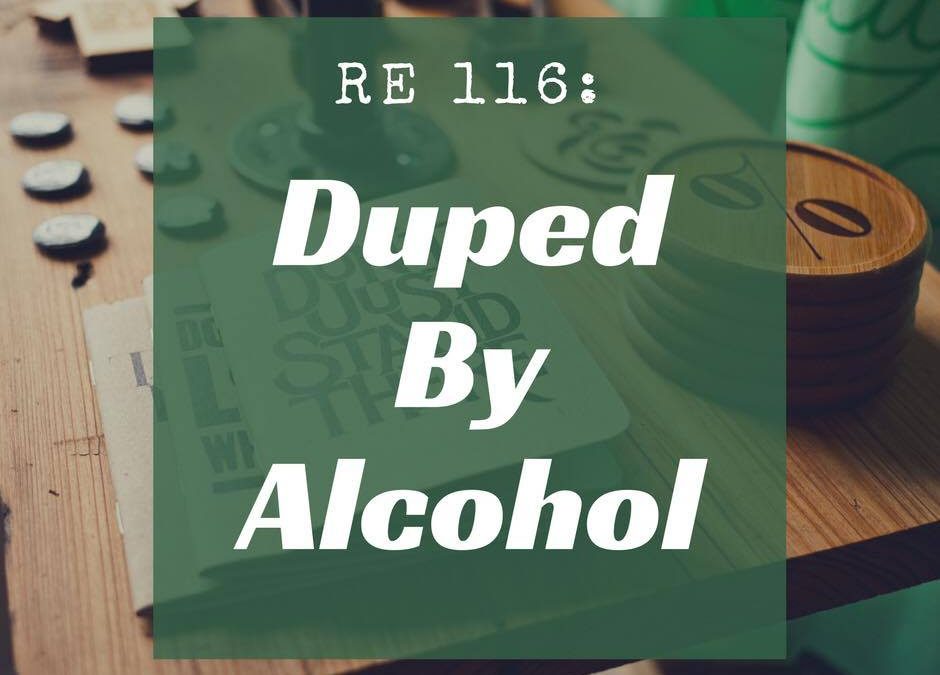
by Paul Churchill | May 8, 2017 | Podcast
Podcast: Play in new window | Download
Subscribe to the Recovery Elevator Podcast Apple Podcasts | | More
Laura, with 41 days since her last drink, shares her story…….
Do you ever feel duped by alcohol? Throughout high school, we were all told to “just say no” to drugs but not much was ever said about alcohol. The reality is that only 1 in 10 people with an alcohol problem get treatment. The research shows that the number 1 most addictive drug is alcohol. It kills more people than all other drugs combined.
In 2015, Paul started the RE podcast just to stay accountable for himself. Now, the podcast has gotten so popular because so many people are still struggling. Even though addiction is a chronic disease of the brain, the stigma attached keeps people from getting the help that they need. The challenge for all of us in recovery is to be open about out alcohol use, and get it out in the open.
SHOW NOTES
[13:29] Paul Introduces Laura.
Laura – I am 40 years old and have not had a drink in 41 days. I am married with 2 boys and I live in Michigan. I am a special education teacher and enjoy most outdoor activities.
[16:41] When did you realize that you had a problem?
Laura – I had been drinking pretty heavily since my 20’s. Last summer when I wanted to stop, I could not. During a routine physical, I mentioned to my Dr. that I had some liver issues and that perhaps I should go to rehab. He advised against it stating that there were only drug abusers in there. He suggested I see their social worker but she wouldn’t see me because I was still drinking. I felt like I was going around and around. I even tried Harm reduction which did not work.
[19:46] When you stopped drinking did your health problems go away?
Laura – not entirely but they have gotten better. I exercise more since I am not drinking and that makes me feel better. My rheumatoid arthritis is still there. I thought that once I quit drinking, I would be pain free but that was not the case. After 40 days of not drinking, I am starting to feel some relief from pain. I have started reading “The All Day Energy Diet.”
[23:14] Paul and Laura discuss the Harm Reduction Plan.
Laura – you are supposed to moderate and keep track of how many drinks you have each day. It wasn’t working for me. I found it difficult remaining in contact with the other people in the group. School started and things got crazy so I started drinking again every night. I wanted to stop but just didn’t want to put the work in to do it.
[25:25] How did that feel when you wanted to stop but just wasn’t ready?
Laura – I could get a few days of sobriety under my belt but would always drink on that 3rd day. I was a responsible drinker and would get everything done in my household by 8pm so that I could start drinking.
[30:00] So how did you get 41 days of sobriety?
Laura – I kept myself very busy or would go for a walk just to keep my mind off of it. Every morning I try to exercise and it feels great to not have the guilt about drinking the night before. After work if I get cravings, I will drink a cup of coffee. I also enjoy reading sobriety books and once the summer starts, I would like to check out some AA and SMART meetings.
[32:14] Do you have anything on your sobriety bucket list?
Laura – I would like to run a 5K, travel, and spend more quality time with my children.
[32:59] What advice would you give to your younger sense?
Laura – Stop drinking when you are young. Drinking is not realistic. It is OK to experience your emotions. Do not be afraid to feel them.
[33:03] What are your thoughts on relapse?
Laura – The thought of relapse scares me. I do not want to lose control like that again.
[35:00] Rapid Fire Round
- What was your worst memory from drinking? I mistakenly hid my husband’s iPad instead of my son’s. The next morning I could not remember where I had hidden it.
- Did you ever have an “oh-shit” moment? I was at a bar with my then boyfriend. I made him so mad that he never spoke to me again and I have no idea what I had done
- What’s your plan moving forward? stay connected, trying some AA and SMART meetings and giving back to the community
- What’s your favorite resource in recovery? I am reading the 30 Day Sobriety Solution, the RE podcast and the RE Face Book group
- What’s the best advice you’ve ever received (on sobriety)? take it 1 day at a time
- What parting piece of guidance can you give listeners who are in recovery or thinking about quitting drinking? Use the resources that are out there and do not give up.
- You might be an alcoholic if….. you order 2 drinks at a time because the bartender is to slow
Interesting fact – India has passed a law that establishments that serve liquor cannot be close to federal highways. They have 400 traffic fatalities a day and a big portion of these are due to alcohol. You might be an alcoholic if you remove federal highway signs and replace them with city signs, so that your business is not affected by this new law.
Resources mentioned in this episode:
Recovery Elevator Retreat
Connect with Cafe RE– Use the promo code Elevator for your first month free
Sobriety Tracker iTunes
Sobriety Tracker Android
Sober Selfies! – Send your Sober Selfie and your Success Story to info@recoveryelevator.com
Check out the new Recovery Elevator sobriety tracker
AALRM – run for recovery. The link is at recoveryelevator.com/run. Enter the promo code recoveryelevator to receive a discount
Book – The All Day Energy Diet by Yuri Elkaim
“We took the elevator down, we gotta take the stairs back up, we can do this!”
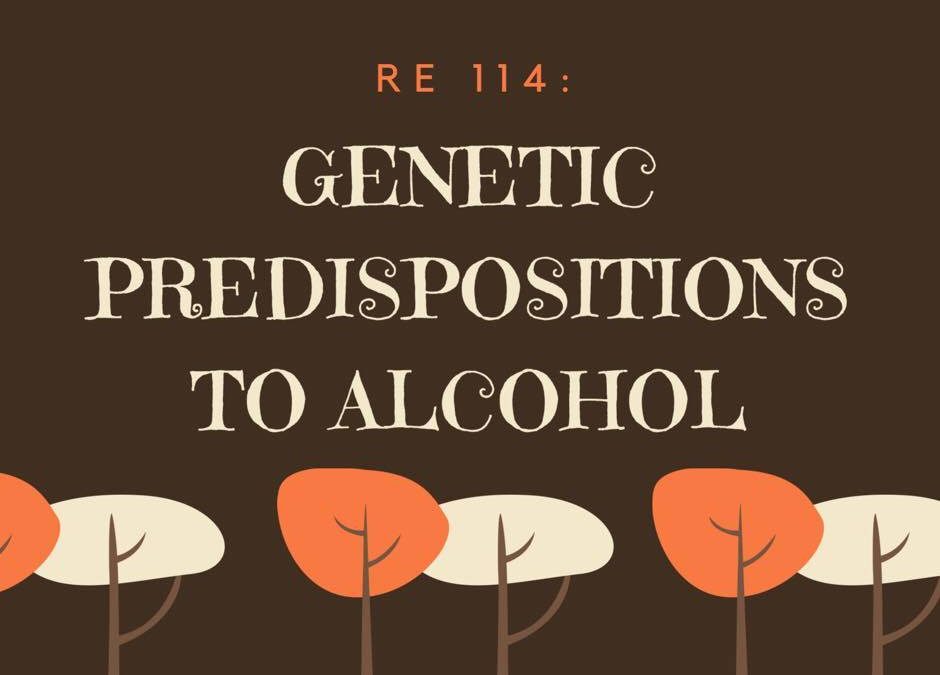
by Paul Churchill | Apr 24, 2017 | Podcast
Podcast: Play in new window | Download
Subscribe to the Recovery Elevator Podcast Apple Podcasts | | More
Coral, with 7 months since her last drink, shares her story……
Do we have to say it again? Let’s drop the stigma regarding addiction. The research shows that alcoholics have a genetic predisposition towards alcohol. It is not a character defect, nor a moral weakness. Yet, even after these results are published, about 20% of the general population, along with many psychiatrists still believe that it is a personal weakness.
Kenneth Bloom conducted early experiments on neurology and molecular genetics. Hundreds of these experiments showed that alcoholism is hereditary. Many adoption studies have also been done and they show that children with at least 1alcoholic biological parent were 3 to 4 times more likely to become an alcoholic, regardless of their non-alcoholic adoptive parents.
When an alcoholic drinks, our neurotransmitters go awry and our bodies break down booze differently than normal drinkers. That’s the facts folks.
SHOW NOTES
[14:08] Paul Introduces Coral.
Coral – I am 32 years old and live in Idaho. I work in an industrial plant. I am married and have a 9 year old son.
[16:08] Did you think you had a problem with drinking?
Coral – My husband and I have been trying to conceive but after our IVF failed, I went on a 2 week bender, full of self- pity. I would grab a beer first thing in the morning. Drinking was not helping anything. Now it just feels surreal to be sober. I did not think that I could do it. Drinking has always been a part of my life. But being in a recovery program keeps me from getting stagnant.
[19:21] When did you realize that you had a problem?
Coral – There were plenty of times I told myself that I should slow down. These slow down plans never worked. I would try to limit hard liquor or not drink during the day. Sometimes I was able to slow down but it never lasted long
[22:11] Paul and Coral discuss her bottoms.
Coral – One of my worst memories was having some new friends over to my house for a BBQ. I ended up tripping over something in the yard and fell into the fire pit. I was burned over 10% of my body. Even after this, I never looked at myself as having a problem. It took a few months to re-cooperate after this accident. I was on heavy pain medications and still drank while on them. After 3 months, I went to the doctor to get a refill of my pain medication. He would not refill my prescription and I ended up going through withdrawal.
[26:00] How did you quit drinking 7 months ago?
Coral – I started listening to podcasts and going to meetings. I joined the Club Soda club on-line and I also started seeing a therapist.
[30:00] Paul and Coral discuss her relationship with her husband and his drinking.
Coral – My husband was also a drinker and struggles a little bit. He has been very supportive of my recovery. He has his own path in recovery and I have mine.
[31:33] When did your thinking shift from “I can’t do this” to “I can do this?”
Coral – Probably around 90 days. I had been denied a promotion that I thought I had in the bag. I felt like jumping out of my own skin. I decided to get in the car and drove many miles to a meeting. I left the meeting wondering why I hadn’t gone to a meeting in so long. It was so good to be around other people with this same problem. Sobriety is my #1 priority now, otherwise I will lose everything.
[33:33] What have you learned the most about yourself?
Coral – I am still learning about myself. Right now I am in the middle of the 4th step and it has been very eye opening.
[34:34] How have your cravings been?
Coral – I do eat a lot of sugar. I gave up alcohol, caffeine and cigarettes at the same time. So I need my sugar. When a craving hits, I try to meditate, exercise or go to a meeting.
[35:40] How have your relationships changed?
Coral – My husband and I get along much better. Instead of having arguments, we discuss things now. I am also closer to my extended family since they are non-drinkers.
[36:43] What is a typical day like for you?
Coral – I usually say a prayer every morning and then head off to work. I will go to a few meetings each week and enjoy spending time with my family.
[37:00] Rapid Fire Round
- What was your worst memory from drinking? falling into the fire pit
- Did you ever have an “oh-shit” moment? I had a major blackout while drinking as a teen. Everyone told me I was running around screaming and I do not remember a thing.
- What’s your plan moving forward? working the steps and helping others
- What’s your favorite resource in recovery? SHAIR podcast, The Bubble Hour podcast and The Big Book
- What’s the best advice you’ve ever received (on sobriety)? You are the average of the 5 people that you hang around with the most.
- What parting piece of guidance can you give listeners who are in recovery or thinking about quitting drinking? If you think you have a problem, than you probably do. You can still have fun without drinking.
- You might be an alcoholic if… you fall into a fire pit but still blame it on the misc. objects in your yard
Resources mentioned in this episode:
Recovery Elevator Retreat
Connect with Cafe RE– Use the promo code Elevator for your first month free
Sobriety Tracker iTunes
Sobriety Tracker Android
Sober Selfies! – Send your Sober Selfie and your Success Story to info@recoveryelevator.com
“We took the elevator down, we gotta take the stairs back up, we can do this!”
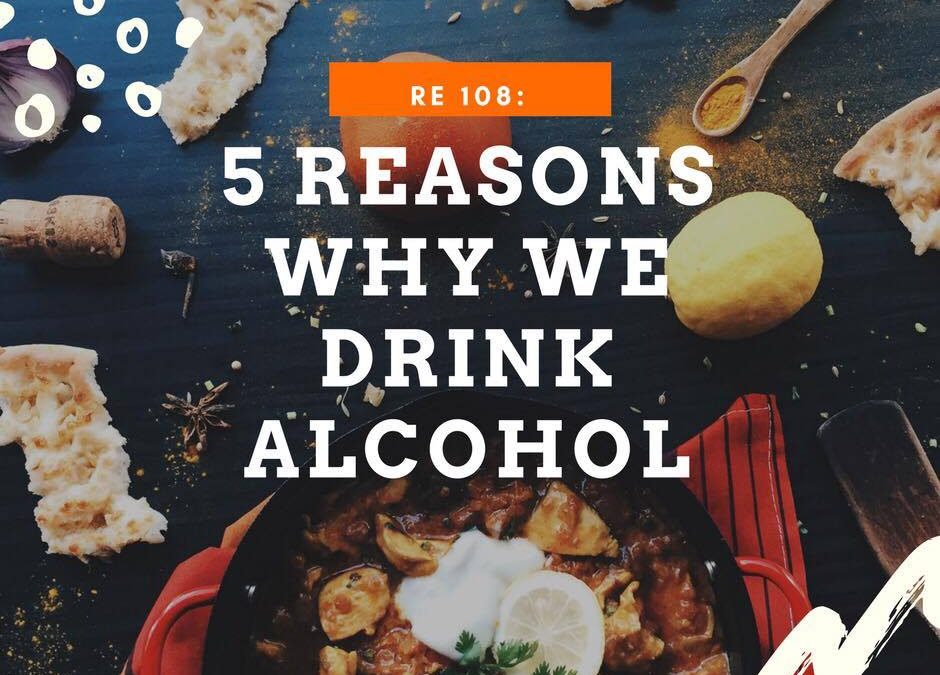
by Paul Churchill | Mar 13, 2017 | Podcast
Podcast: Play in new window | Download
Subscribe to the Recovery Elevator Podcast Apple Podcasts | | More
Amanda, with 19 months since her last drink, shares her story
Why we drink:
- Alcohol is everywhere. Drinking appears to be the norm. We are bombarded with alcohol advertisements 67 times a day. Our society has a love affair with booze.
- We have a genetic make-up to become addicted to alcohol.
- Our environment is flooded with alcohol. We think everything we do should be accompanied by alcohol.
- Alcohol is a highly addicted drug.
- We have shitty coping skills.
Not on the list of why we drink: a moral failing or a weakness of character
SHOW NOTES
[ 7:45 ] Paul Introduces Amanda. How long have you been sober?
Amanda – I have been sober for 19 months. This is the longest I have ever been sober. I feel very proud of myself.
[ 8:51 ] What is your background?
Amanda – I am from Mississippi but now live in Florida with my 15 year old daughter.
[ 10:27 ] Did you ever try to put rules in place to moderate your drinking?
Amanda – I started drinking when I was 16 so there were no rules in the beginning. I was that sloppy drunk girl in the room. I would start watching the clock for 5:00 which meant it was time to drink.
[ 12:34 ] When did you first realize that you had a problem?
Amanda – In 2010, one bad thing after another happened to me. I was put in jail for domestic violence. I was so ashamed of not being able to control myself with alcohol. I felt that I was a strong person since I had raised my daughter alone. I did not want to appear weak and vulnerable.
[ 14:26 ] Amanda and Paul discuss the stigma of addiction.
Amanda – I had twin cousins who died because of alcohol. Their memory and my daughter were the only reasons why I didn’t commit suicide myself. I felt like no one cared about me so why should I care about myself?
[ 16:01 ] How did you get sober?
Amanda – I did not use AA. I went to a rehab that taught the 12 steps but after I was released, there was no support. No one called or checked on me. My parents had basically just dropped me off at rehab. I still drank for 4 years and then turned to meth. I finally decided that I was either going to die or go back to jail. I moved to another state but was still hanging out with the same type of people. I knew I needed to give up booze so I started looking for something else to do. This led me to find a group of people who were into mud runs. I got into fitness.
[ 21:42 ] Amanda and Paul discuss her days in rehab and her personal development.
Amanda – I did not feel like anything had changed after my 60 days in rehab. Afterward I started looking into motivational development. Someone told me that I was born with a purpose. Everyone has the power to help others. I was under the false assumption that life was going to be a piece of cake. I joined a personal development community (Breather University). The people in this group accepted me and my life has completely changed. I am Amanda and I am amazing! I am not a part of sobriety groups because I hate the alcoholic label. What you say about yourself is what you are.
[ 33:36 ] What is your pump up song?
Paul – Limp Bizkit, “Nookie” (Life is an opportunity, not an obligation).
Amanda – Jason Aldean, “Gonna Know We Were Here” (Self-affirmations are super important to me).
[ 34:08 ] What is your relationship like with your daughter?
Amanda – We have had to rebuild our relationship. She lived with my parents for the last 6 months that I was using. She moved in with me when I went to Florida. There has been a lot of growing and we have had to push through the hard times.
[ 36:50 ] What is a typical day like for you?
Amanda – I say positive affirmations to myself every day. I list 3 things that I am grateful for every day. I try to exercise, read or watch personal development videos every day.
[ 39:09 ] Rapid Fire Round
- What was your worst memory from drinking? getting knocked out by a big guy I had tried to beat up
- Did you ever have an “oh-shit” moment? jail
- What’s your plan moving forward? sharing my story to give others hope
- What’s the best advice you’ve ever received (on sobriety)? everything that you go through, isn’t always about you
- What parting piece of guidance can you give listeners who are in recovery or thinking about quitting drinking? life is beautiful, fill your void with goodness
- You might be an alcoholic if….. you duct tape 2 beers to your hands so that you do not lose them
Resources mentioned in this episode:
Recovery Elevator Retreat
Connect with Cafe RE– Use the promo code Elevator for your first month free
Sobriety Tracker iTunes
Sobriety Tracker Android
Sober Selfies! – Send your Sober Selfie and your Success Story to info@recoveryelevator.com
Amanda U-Tube videos – Patched Wangs
Book “Beyond the Influence,” by Katherine Ketcham
“We took the elevator down, we gotta take the stairs back up, we can do this!”







